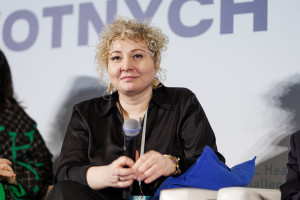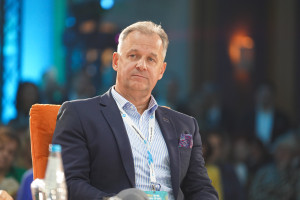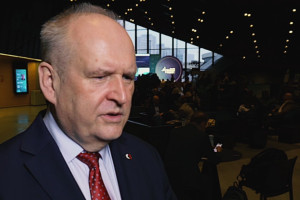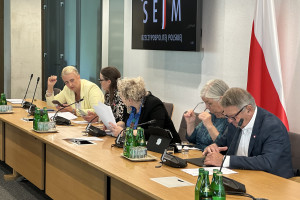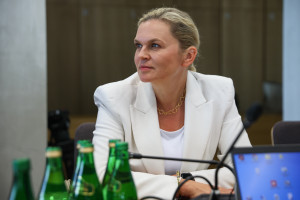Will Cheap Weight Loss Drugs From Canada Take Over the World? "This Could Be a Game Changer"

 Author: Luiza Jakubiak • Source: Rynek Zdrowia • Added: July 26, 2025 07:57 • Updated: July 26, 2025 08:19
Author: Luiza Jakubiak • Source: Rynek Zdrowia • Added: July 26, 2025 07:57 • Updated: July 26, 2025 08:19
The patent for semaglutide will expire in Canada in early 2026. Generic companies are already planning to enter the market with cheaper competing drugs. A digital platform has also announced its intention to take action. This could revolutionize access to the blockbuster drug globally.
- Novo Nordisk's semaglutide expires in Canada in January 2026
- This paves the way for generic competition. Sandoz CEO Richard Saynor: "We have submitted an application in Canada and are awaiting approval when data exclusivity expires in the first quarter of next year."
- The American digital platform Hims & Hers Health has similar plans. On July 9, 2025, it announced it would offer generic semaglutide in Canada.
- "The loss of patent protection for semaglutite could have a broader impact than just the 40 million Canadians. Remember, the massive American market is right next door, and practically the entire world is just a click away and delivery is a few days away," says Dr. Mariusz Kondrat.
- Digital platform Hims & Hers Health aims to offer access to more affordable therapy through its e-commerce platform, providing patients with 24/7 access to licensed specialists and personalized treatment plans
- - This could be a breakthrough for patients in Canada, but it will also be a signal for the entire pharmaceutical industry: digital health platforms and generics can work together to change the availability of treatment on a global scale - commented Marcin Gawroński, IQVIA's director of innovation for Europe, the Middle East and Africa, on LinkedIn.
US digital platform Hims & Hers Health announced on July 9, 2025, that it will offer generic semaglutide in Canada, as Novo Nordisk's patent on its branded drugs Ozempic and Wegovy expires in January 2026.
" Canada presents a tremendous opportunity to showcase what affordable, high-quality weight loss care can look like. As generic semaglutide becomes available globally for the first time, we are focused on making it truly accessible, combining affordability with personalized care at scale," said Andrew Dudum, co-founder and CEO of Hims & Hers Health, as quoted by CNBC.
This news has already spread across the world's media. Just like the previous year, the loss of a patent due to failure to pay a small fee (the equivalent of $250) for its maintenance.
The drug is protected by a patent for 20 years. Manufacturers can also benefit from additional protection in the form of regulatory exclusivity. In Canada, Novo Nordisk filed a patent for semaglutide in March 2006, so the basic patent is scheduled to expire in March 2026. However, it requires the manufacturer to pay maintenance fees. At the same time, the manufacturer enjoys regulatory exclusivity, which lasts eight years from the product's market launch. In this case, regulatory exclusivity for semaglutide will expire in January 2026.
It turns out that the company last paid a patent maintenance fee in 2018. The patent expired in 2020. However, the Canadian system allows for a maximum two-year extension of patent protection through a Certificate of Supplementary Protection (CSP ), which compensates for delays in regulatory approval of the medicinal ingredient covered by the patent. This would provide protection until March 2028. However, because the underlying patent expired prematurely and is no longer recoverable, the CSP cannot come into effect.
What happened has given rise to speculation as to whether we are dealing with a costly omission resulting from the failure to pay a small fee or a deliberate waiver of the patent?
The company itself claims this wasn't an oversight or a mistake, but a deliberate intellectual property strategy that is "carefully considered at a global level," and that "exclusivity periods for pharmaceutical products end as part of their normal life cycle, and generic therapies may become available over time." We asked the company for its current position on this matter but had not received a response by the time of publication.
The texts on this matter are rife with assessments of the validity of this calculation, especially since the decision was made before the COVID-19 pandemic, which has accelerated digital transformation, including in trade.
Some comments indicate that Novo Nordisk relinquished its patent rights to avoid the PMPRB, believing that the additional two years of CSP were not worth the eight years of price reduction . This echoes the perception that Canada is not an attractive market because it controls drug prices. The PMPRB is Canada's Patented Medicine Prices Review Board . In simple terms, the Board monitors, analyzes, and negotiates prices for drugs that are under patent and do not yet have generic equivalents, ensuring affordability for patients.
This strategy works well if the drug is either very complex to manufacture or the market is small—in other words, if investing in a biosimilar isn't worth the effort. It seems Novo has miscalculated, unless they can successfully shift the market to their oral formulation, one commenter said.
The number of generic competitors will undoubtedly be limited, as it is a biologic drug and therefore more difficult to reproduce than a chemical product. However, GLP-1 is a small oligopeptide with low complexity by biological standards.
Ozempic isn't the only weight-loss drug in Novo Nordisk's portfolio. The company may have already calculated that more effective and convenient drugs, such as Wegovy or Rybelsus, available in tablet form, would gain a stronger market position. Amycretin, combining the action of a GLP-1 receptor agonist with amylin, is in Phase 3 clinical trials.
However, in the meantime, the company has faced serious competition from tirzepatide-based drugs, primarily Mounjaro and Zepbound.
- With hindsight, we can assess whether the commercial assessment was correct, but it was not an "error" in the sense that someone at Novo did not fulfill their duties or missed a deadline - reads another assessment.
He points out that a large part of Ozempic's success stems from Novo Nordisk's patent filing activity: the company has managed to maintain a dominant position in the type 2 diabetes market by filing patents for semaglutide in more than two dozen jurisdictions. The company continues to pay renewal fees for many of these patents, including in major markets such as the United States and the EU.
But Dr. Mariusz Kondrat, European patent attorney and managing partner of the Kondrat i Partnerzy law firm, has doubts about this explanation:
" Pharmaceutical companies rarely renege on patent extensions, and even more rarely do they do so selectively, covering only certain countries . Considering that the case concerns a key patent for one of the world's best-selling products, the argument of a conscious strategy to abandon patent protection doesn't seem plausible. I prefer the explanation of human error, and as we know, mistakes happen to everyone, even the best."
Who wants to profit from patent expiration?Regardless, the decision has far-reaching implications. According to research firm Grand View Research, the Canadian semaglutide market will generate revenue of $1.18 billion in 2024 and is expected to reach $4.03 billion by 2035. It's not just the Hims & Hers Health platform that's hoping to capitalize on Novo Nordisk's GLP-1 patent expiration.
There is no generic version of semaglutide approved by Health Canada yet in the Canadian market, but the approval process has already begun. In early June of this year, Sandoz CEO Richard Saynor announced the submission of an application for approval of a generic version of semaglutide to the Canadian agency in an interview with Endpoints : "We have submitted an application in Canada and are awaiting approval once data exclusivity expires in the first quarter of next year."
Professor Mina Tadrous of the University of Toronto, who analyzes drug prices, among other things, talks about four companies that are beginning the formalities. He estimated for CBC News how much drug prices could drop after the entry of generic competition: "If you have just one company, the list price drops by 75 per cent. If you have two companies, the price drops by 50 per cent, and if you have three or more, it drops by 35 per cent. Three manufacturers could reduce the price of a drug from 400 Canadian dollars to less than 100. "
However, entering the market with generic competitors also comes with certain limitations. Companies will need to compete fiercely at an early stage to quickly establish a foothold.
The expiring patent for the substance isn't the only patent protecting the company's product. The pen-based drug delivery system, which is crucial for patient compliance, is still under patent protection. If generic drugs fail to cost-effectively replace pens, Novo Nordisk could extend its dominance. The question is, will Sandoz introduce a fully biosimilar drug, meaning it comes with a pen, or a cheaper but less user-friendly alternative?
- Any cheaper and reliable alternatives, even if they are slightly less convenient, are doomed to success - argues Dr. Kondrat.
Other barriers that could arise include supply chain bottlenecks and regulatory delays: Health Canada's approval timelines for biosimilars could delay their launch beyond 2026.
Canada's window to the worldThe entry of generic competition wouldn't be profitable if it were limited to the Canadian market. Companies plan to ship drugs from Canada to numerous countries, which—according to Dr. Kondrat—is legally problematic, but in practice could have significant implications:
Losing patent protection for semaglutite could have a broader impact than just the 40 million Canadian population . Remember, the massive American market is just a click away, and practically the entire world is just a few days away, just a few clicks away, and delivery is within reach.
" The success of Chinese trading platforms like Temu demonstrates how simple it can be to purchase and deliver a product over very long distances . Of course, from a patent perspective, the lack of patent protection in Canada doesn't mean you can freely ship patent-protected products to other countries, because in those countries, you'd be dealing with a violation of the law. However, these micro-infringements are difficult to enforce. Micro-infringements aren't minor infringements. These are obvious patent infringements, but due to their fragmented nature, they are very difficult to enforce. It's undoubtedly worth monitoring the development of the situation and the methods used by patent holders to enforce their rights in those jurisdictions where the patent remains in force," emphasizes the lawyer.
Cheap weight-loss drugs available in Canada will undoubtedly impact the U.S. market, where the patent doesn't expire until 2032. However, the U.S. has a Section 804 importation program (SIP) , which allows states, tribes, and certain other entities to submit applications to the U.S. Food and Drug Administration (FDA) to import prescription drugs from Canada to lower the cost of the drugs for consumers, provided they can demonstrate that the program will not pose additional safety risks and will result in significant savings.
This year, President Donald Trump even signed an executive order , Lowering Drug Prices by Once Again Putting Americans First , which aims to lower the cost of prescription drugs in the US.
Semaglutide in a pharmacy prescriptionIt's worth returning to the Hims & Hers Health platform mentioned at the beginning. The idea for this business came from life itself. The story of the two entities' collaboration is reported by The Washington Post, albeit rather one-sidedly, as the Danish company declined to comment on the business relationship.
The whole affair began when Novo Nordisk fell victim to its own success – semaglutide, a weight-loss product, became so popular there that the company couldn't keep up with production, and shortages began to occur . The FDA placed it on the list of shortage drugs. This regulation paved the way for pharmacies to manufacture prescription drugs and for companies like Hims & Hers Health to sell them.
In February of this year, the FDA announced the end of the semaglutide shortage by ordering digital platforms to stop offering Ozempic . However, the company used regulations that allow for modifications to the prescription drug if doctors determine it has a "significant impact" on an individual patient.
Such personalized drug doses could not be welcomed by Novo Nordisk, which considered them dangerous, criticizing the mass sale of prescription drugs under the false pretext of "personalization."
At the same time, it signed an agreement with the platform to sell Wegova. In an April 29 interview with The Washington Post, a Novo Nordisk representative reportedly said that it was partnering with Hims & Hers Health because more and more people were using telemedicine for care. He expressed hope that personalized semaglutide would be offered in exceptionally rare cases.
The two companies even reportedly discussed a new product, with Novo Nordisk producing Wegovy and Hims & Hers Health selling it under its own brand . However, in exchange, Hes & Hers Health was supposed to abandon the prescription business. Apparently, this didn't happen, as on June 23, Novo Nordisk publicly announced the end of the partnership.
Online platforms are taking the world by stormNow Hims & Hers Health announces operations in Canada.
The company aims to offer access to lower-cost therapy through its e-commerce platform, providing patients with 24/7 access to licensed specialists and personalized treatment plans.
"This could be a breakthrough for patients in Canada, but it will also send a signal to the entire pharmaceutical industry: digital health platforms and generics can work together to transform access to treatment on a global scale. With the growing popularity of GLP-1 therapy and the digitalization of medicine, this move could be a game-changer—not only in Canada but globally," commented Marcin Gawroński, IQVIA's director of innovation for Europe, the Middle East, and Africa, on LinkedIn.
Copyrighted material - reprint rules are specified in the regulations .
rynekzdrowia



